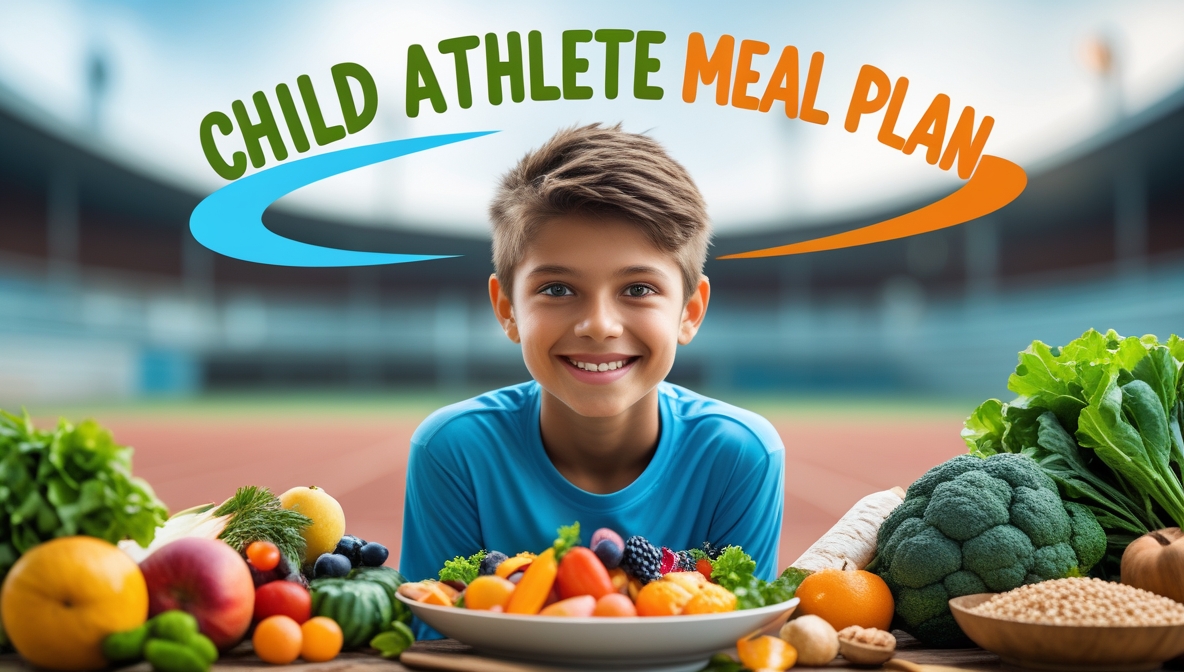Young athletes require a balanced diet to fuel their growing bodies and active lifestyles. A well-structured athlete meal plan ensures that young athletes receive the right balance of nutrients to fuel their activities and support their overall growth. Proper nutrition supports energy, stamina, and recovery, laying the foundation for both athletic performance and overall health. Here’s a detailed guide to structuring meal plans that help child athletes thrive.
Key Nutritional Components for Young Athletes
Carbohydrates: Energy Powerhouse
Carbohydrates provide the primary source of energy. Focus on complex carbs for sustained energy release.
- Sources: Whole-grain bread, brown rice, quinoa, oatmeal, and sweet potatoes.
- Timing: Include carbs at every meal, especially pre- and post-activity.
Protein: Muscle Repair and Growth
Protein helps build and repair muscles after strenuous activity.
- Sources: Lean meats, poultry, fish, eggs, dairy, tofu, beans, and nuts.
- Timing: Spread protein intake evenly throughout the day.
Fats: Essential Energy Reserve
Healthy fats support long-term energy needs and overall development.
- Sources: Avocado, nuts, seeds, olive oil, and fatty fish like salmon.
- Balance: Limit saturated and trans fats; prioritize unsaturated fats.
Vitamins and Minerals: Micronutrient Boost
Micronutrients ensure proper growth, immune function, and energy metabolism.
- Sources: Leafy greens, colorful vegetables, fruits, dairy, and fortified cereals.
- Key Nutrients: Calcium, iron, and vitamin D are particularly vital for bone health and oxygen transport.
Hydration: Staying Energized and Alert
Proper hydration prevents fatigue and supports focus during physical activity.
- Sources: Water, low-fat milk, and electrolyte drinks for extended exercise sessions.
- Avoid: Sugary sodas and energy drinks.
Meal Planning: Structuring the Day
Breakfast: A Strong Start
Breakfast should provide long-lasting energy to kick-start the day.
Examples:
- Whole-grain toast with peanut butter, banana slices, and a glass of milk.
- Greek yogurt topped with granola and fresh berries.
- Scrambled eggs with spinach, a whole-grain tortilla, and an orange.
Mid-Morning Snack: Quick Energy Boost
A snack helps maintain energy levels between meals.
Options:
- Apple slices with almond butter.
- Trail mix (nuts, seeds, and dried fruit).
- Low-fat cheese sticks with whole-grain crackers.
Lunch: Balanced Refueling
Lunch should combine all macronutrients to keep energy sustained.
Sample Meals:
- Grilled chicken sandwich with lettuce, tomato, and a side of carrot sticks.
- Turkey and avocado wrap with whole-grain tortilla and mixed fruit salad.
- Pasta with lean ground turkey, marinara sauce, and steamed broccoli.
Afternoon Snack: Preparing for Activity
Pre-activity snacks should be light and rich in carbs.
Ideas:
- A granola bar and a handful of grapes.
- Low-fat yogurt with sliced strawberries.
- A small bowl of oatmeal with honey.
Dinner: Recovery and Growth
Post-activity dinner focuses on replenishing energy and repairing muscles.
Examples:
- Baked salmon with quinoa and roasted asparagus.
- Grilled chicken stir-fry with mixed vegetables and brown rice.
- Beef stew with sweet potatoes and a side of spinach salad.
Evening Snack: Light and Restorative
A light snack can aid muscle recovery while avoiding indigestion before bed.
Suggestions:
- Cottage cheese with pineapple chunks.
- A small smoothie made with milk, spinach, and frozen berries.
- Whole-grain crackers with hummus.
Sample Weekly Meal Plan for Child Athletes
Monday
- Breakfast: Oatmeal with chopped nuts and a sliced apple.
- Snack: Low-fat yogurt with granola.
- Lunch: Turkey and cheese sandwich on whole-grain bread, baby carrots, and an orange.
- Snack: Hard-boiled egg and a banana.
- Dinner: Grilled chicken, mashed sweet potatoes, and steamed broccoli.
- Snack: A handful of almonds.
Tuesday
- Breakfast: Scrambled eggs, whole-grain toast, and strawberries.
- Snack: Sliced cucumbers and hummus.
- Lunch: Pasta salad with grilled chicken, cherry tomatoes, and olive oil.
- Snack: Cheese sticks with whole-grain crackers.
- Dinner: Baked tilapia, brown rice, and sautéed spinach.
- Snack: A small fruit smoothie.
Wednesday
- Breakfast: Whole-grain waffle with almond butter and blueberries.
- Snack: A granola bar.
- Lunch: Veggie-packed burrito bowl with black beans and avocado.
- Snack: A pear and a handful of walnuts.
- Dinner: Lean beef stir-fry with quinoa and roasted Brussels sprouts.
- Snack: Cottage cheese with peach slices.
Pre- and Post-Workout Nutrition Tips
Pre-Workout
- Focus on simple carbs and small amounts of protein.
- Examples: Half a bagel with peanut butter, a banana, or a small energy bar.
Post-Workout
- Replenish glycogen stores and repair muscles with a combination of carbs and protein.
- Examples: Chocolate milk, a turkey sandwich, or a protein smoothie.
Common Pitfalls and How to Avoid Them
Skipping Breakfast
Missing breakfast reduces energy levels for morning activities.
Solution: Keep quick options like yogurt or whole-grain muffins handy.
Relying on Processed Foods
Pre-packaged snacks often lack essential nutrients.
Solution: Prep fresh snacks like cut veggies or homemade energy bites.
Inadequate Hydration
Dehydration can impact performance and recovery.
Solution: Encourage regular water intake throughout the day.
Unbalanced Meals
Overemphasis on one nutrient can lead to deficiencies in others.
Solution: Aim for balanced plates with carbs, protein, and healthy fats.
Choosing the Wrong Foods
Knowing what foods should athletes avoid is just as important as selecting the right ones. Highly processed snacks, sugary drinks, and fried foods can hinder performance and recovery.
Solution: Replace these with fresh, whole foods that provide lasting energy and essential nutrients.
Tips for Picky Eaters
- Sneak Vegetables: Blend spinach into smoothies or add grated zucchini to pasta sauce.
- Involve Kids: Let them help prepare meals to increase interest in trying new foods.
- Offer Variety: Rotate fruits, vegetables, and proteins to keep meals exciting.
Proper meal planning helps child athletes achieve peak performance while supporting their growth and development. Structuring a balanced diet with nutritious meals and snacks ensures they stay energized, recover effectively, and maintain a strong foundation for both sports and daily activities.
